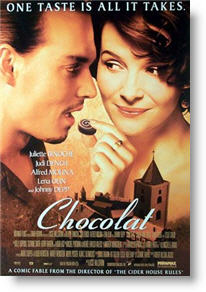Chocolat
 for a scene of sensuality and some violence.
for a scene of sensuality and some violence.
Reviewed by: Artie Megibben
CONTRIBUTOR
| Moral Rating: | Very Offensive |
| Moviemaking Quality: |
|
| Primary Audience: | Adults Teens |
| Genre: | Romance Comedy |
| Length: | 2 hr. 1 min. |
| Year of Release: | 2000 |
| USA Release: |
December 15, 2000 (NYC/LA) December 22, 2000 (limited) January 19, 2001 (wide) |


| Featuring |
|---|
|
Juliette Binoche … Dr. Ouelet Johnny Depp Judi Dench Alfred Molina Lena Olin |
| Director |
| Lasse Hallström (Lasse Hallstrom) |
| Producer |
| Alan C. Blomquist, David Brown, Kit Golden, Leslie Holleran |
| Distributor |
“One taste is all it takes.”
“Chocolat” is a modern morality play where morality is the bad guy and tolerance is its brave heroine. You know, that well-worn plot that flows so effortlessly from the pens of Hollywood writers and secular authors. We saw it in the 80s with the movie “Footloose”, in the 90s with the film “Pleasantville.” And most recently in director Lasse Hallström’s previous film, “The Cider House Rules.”
Instead of a narrow-minded fundamentalist preacher who spews forth damnation upon the evils of dance, or a claustrophobic B&W world where Fathers still Know Best, or even a quaint backward time when abortions were illegal, “Chocolat” deals with a time where a pervasive Catholic Church threatens to choke the joie de vivre, out of a quiet French village. Here, Comte de Reynaud played by Alfred Molina, is the mayor and moral center of the peaceful hamlet. He proofreads the priest’s sermons, rehabilitates the town wife-beater and organizes the community’s boycott against rampant immorality. You got it. He’s the evil Religious Right, the holier-than-thou Moral Majority—he, my brethren, is YOU!
But before you strike “Chocolat” off your “To See” list, consider this—the religious morality in these sorts of movies is always off-center, legalistic and ruthlessly judgmental. The sort of religious bigotry that Jesus spoke out against. The sort of merciless sanctimony that nailed Him to the cross. And that, my beloved, truly IS a bad guy. The only problem is—it is Grace, not tolerance or autonomy, which is the Good Guy. And occasionally, Grace is still manifested in the teachings of the Church. Teachings that frankly “Chocolat” seeks to depict as oppressive and unenlightened.
In the story, Vianne, an itinerant chocolatier and single mom (Juliette Binoche … Dr. Ouelet
) and her out-of-wedlock daughter, Anouk, blow into town (literally blow, mind you) propelled by the North Wind, a symbol of change and freedom. It is the beginning of Lent, so setting up a Chocolate Shop is viewed as a clear affront to civility and an obvious temptation to the faithful’s Lenten fasts. The town Mayor, the Comte, sets out to discredit this vile temptress and her illegitimate daughter. Not hard to do in the 1950s in which the story takes place. But soon, villagers partake of her delicious chocolates made with a 2,000 year-old Mayan recipe.
So what’s it gonna be folks? 2,000 year-old Christianity or 2,000 year-old pagan bon bons? Well, considering the village’s Christianity has produced nothing but hypocrisy, battered wives, family discord and general oppression, the chocolates look pretty darn good. And as an added plus, these chocolates apparently produce renewed sexual passion, empowering feminine fortitude, and a touching reunion between the town’s crusty matriarch (Judi Dench) and her twelve-year old grandson.
The tide further begins to turn when another foreign force blows up river, a pack of gypsy river rats led by an Irish-tongued Johnny Depp. Soon the Mayor’s boycotts, sermon rewrites and second-handed sanctimony are of no use to stem the tide of tolerance and inclusion. By the end of the movie the Easter message’s Risen Christ sounds more like a politically-correct candidate in a Democratic run-off.
Be warned, the film is a chocolate-lovers delight, full of decadent cinematography featuring tempting truffles and piping hot cocoa. It also contains not-so-discreet glimpses of steamy, sexual encounters that give it its PG-13 rating. (Yes, this one pretty much hits all our appetites.)
On a positive note, the film, like Hallstrom’s “Cider House Rules”, also celebrates community—and if you watch closely—it shows the hollowness inherent in the footloose, solo life-styles it so heartily commends. The daughter longs to be accepted by the status quo, to have a mother who doesn’t break conventions, to have stability and maybe even a father-figure who could provide a sense of emotional wholeness. Even Binoche’s liberated character elects to settle down and let someone else spread her self-styled message of autonomy. A timely reminder, that in any age, too much freedom is as oppressive as too little.
After all, the true Risen Christ is not about joyless obedience nor is He about rudderless liberty. He calls us instead to take His yoke upon us. A yoke that is easy—but a yoke nonetheless.


. She “has no place to lay her head,” instead going from place to place as the wind (symbolically, spirit—“neuma”) leads her. She has a daughter the townsfolk regard as “illegitimate” because they don’t know who the father is; of course, ancient society regarded Jesus as illegitimate for the same reason. She invites all to taste a banquet, a heavenly meal made from a “2000-year-old recipe.”
She overcomes estrangement and turns the hearts of (grand)children to their (grand)parents. She protects, if not a woman about to be stoned by elders, a woman about to be beaten horribly by her husband. She heals on the sabbath (or at least Lent), gives to the poor and keeps no record of wrongs (such as thefts from her shop). A hundred healing miracles bloom around her. In short, Vienne’s chocolate shop is a place where grace enters the village—where all are invited to taste God’s goodness. It is a place of Communion. The town’s power structure—embodied in a well-meaning, but rigid Count, who plays the Pharisee role—enforces Lent as a time of fasting. Lent is a wonderful and meaningful Christian tradition, of course.
But, as Jesus said, the moment when God’s mercy comes upon you is a time for celebration, not fasting. Vienne’s healing chocolate shop thus becomes for the Count a symbol of decadence and disrespect. Of course, this is exactly how Jesus and his disciples appeared to pious contemporaries. Nowhere is the kinship between Vienne and Christ made more clear than near the end of the film, when an image of Jesus on the cross is seen shortly before an image of a woman, made of chocolate, standing in Vienne’s window. The resident Pharisee’s response to both figures show that yes, today is indeed Easter and all are invited to taste God’s sweetness.
But these characters are not puppets in a tale told in Peretti-esque comic-book melodrama; they are recognizable human beings who display the inevitable human complexity. The viewer who decides that the Count is always a hopeless killjoy and that Vienne is always a magical ministering angel soon finds such neat categories overthrown.
In the course of the story, we see the Count try valiantly, if misguidedly, to heal a broken marriage; when confronted with the logical outcome of his own guidance, he is rightly appalled and humbled, and does exactly what he needs to do. At the same time we see Vienne, for all of the healing she offers the townspeople, running roughshod over the needs of her own daughter in a way reminiscent of the Count’s treatment of the townspeople; she too risks becoming too attached to forms while overlooking “the weightier matters of the law.”
The bringer of grace needs grace, too, and the story will not be truly resolved until she finds it. As in any well-told tale, then, each character partakes of the other in some way. It is a story gracefully told, free of lecturing and pious cliches, full of recognizable and endearing personalities. The turnabouts are as discomfiting for today’s Christian as Jesus’ turnabouts were for his Jewish contemporaries. Vienne’s fondness for pagan images will disqualify her, in the minds of some viewers, as a Christ-like figure of any sort—just as Jesus’ use of pagan images to describe the afterlife (“tartarus” and “paradise” are images from Greek myth) disqualified him as a religious leader in the minds of Sadducees. But “wisdom is validated by all her children,” as Christ said. If you believe him, you will enjoy watching one of wisdom’s children work her magic in this story. All things are ready—come to the feast!
and Victoire Thivisol have such a great connection as mother and daughter. It was also wonderful to see the church choose joy over man-made church rituals. It illustrated that tradition without love is worthless. Definitely one for my collection. [Average / 4½]
and Judi Dench! And I’m happy to say I was not disappointed. “Chocolat” had a great story with great acting with tons of humorous and sentimental parts, as well as some good looking chocolate. Binoche and Thivisol really clicked well as mother and daughter, which is a testament to both their abilities in acting. Now it’s understandable why some would be critical of it because of morality. However, I didn’t see the movie glorifying any immoral behavior. I saw the virtues of generosity, charity, forgiveness, community, and humility extolled without any swearing anywhere. It was also great to see the townspeople freed from the burden of man-made religious tradition for wholesome joy. Fasting only has meaning if you do it out of love, not for tradition’s sake. God wants us to enjoy life, and there’s nothing wrong with chocolate. [Average / 4½]

What the movie looks down upon was not morality, because there was hardly a hint of immorality in it, but overblown use of self sacrifice. These people were getting way out of hand in the denial department, far past what Jesus asked of us. Their relationship with Jesus was merely through devotion and not by heart and soul.
Christ knew such legalism would kill the true spirit of people. Why did he fight so harshly against the Jews making The Law their religion? I could understand your argument if in the end, the church was scarred “the evil bad guy” and left to rot, but this was not the case. In the end of the story, the priest asks the people to remember what their religion was truly about—Christ, his kindness, and the demand that they follow in his foot steps…